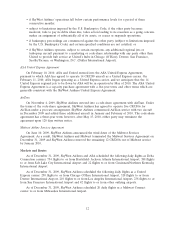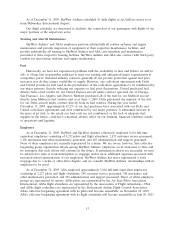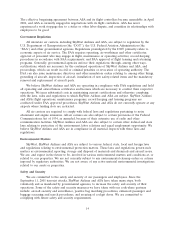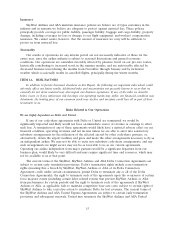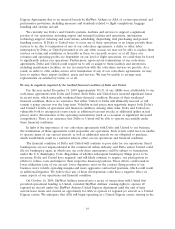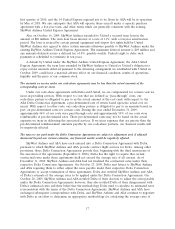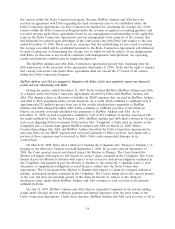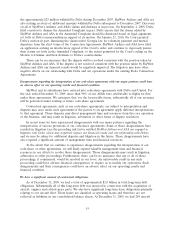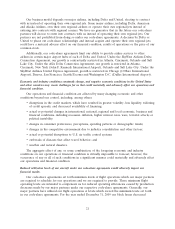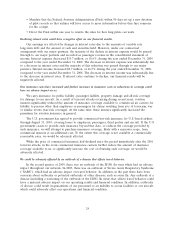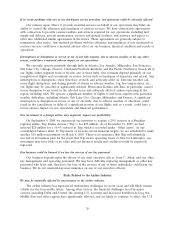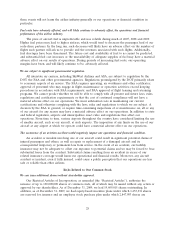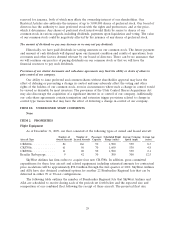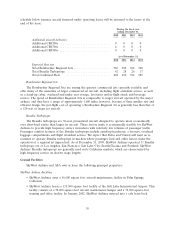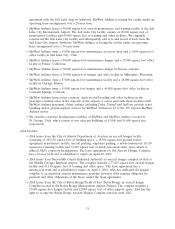SkyWest Airlines 2009 Annual Report Download - page 25
Download and view the complete annual report
Please find page 25 of the 2009 SkyWest Airlines annual report below. You can navigate through the pages in the report by either clicking on the pages listed below, or by using the keyword search tool below to find specific information within the annual report.Our business model depends on major airlines, including Delta and United, electing to contract
with us instead of operating their own regional jets. Some major airlines, including Delta, American
and Alaska Airlines, own their own regional airlines or operate their own regional jets instead of
entering into contracts with regional carriers. We have no guarantee that in the future our code-share
partners will choose to enter into contracts with us instead of operating their own regional jets. Our
partners are not prohibited from doing so under our code-share agreements. A decision by Delta or
United to phase out code-share relationships and instead acquire and operate their own regional jets
could have a material adverse effect on our financial condition, results of operations or the price of our
common stock.
Additionally, our code-share agreements limit our ability to provide airline services to other
airlines in certain major airport hubs of each of Delta and United. Under the SkyWest Airlines Delta
Connection Agreement, our growth is contractually restricted in Atlanta, Cincinnati, Orlando and Salt
Lake City. Under the ASA Delta Connection Agreement, our growth is restricted in Atlanta,
Cincinnati, New York (John F. Kennedy International Airport), Orlando and Salt Lake City. Under the
SkyWest Airlines United Express Agreement, growth is restricted in Chicago (O’Hare International
Airport), Denver, San Francisco, Seattle/Tacoma and Washington D.C. (Dulles International Airport).
Economic and industry conditions constantly change, and negative economic conditions in the United States
and other countries may create challenges for us that could materially and adversely affect our operations and
financial condition.
Our operations and financial condition are affected by many changing economic and other
conditions beyond our control, including, among others:
• disruptions in the credit markets, which have resulted in greater volatility, less liquidity, widening
of credit spreads, and decreased availability of financing;
• actual or potential changes in international, national, regional and local economic, business and
financial conditions, including recession, inflation, higher interest rates, wars, terrorist attacks or
political instability;
• changes in consumer preferences, perceptions, spending patterns or demographic trends;
• changes in the competitive environment due to industry consolidation and other factors;
• actual or potential disruptions to U.S. air traffic control systems;
• outbreaks of diseases that affect travel behavior; and
• weather and natural disasters.
The aggregate effect of any, or some combination, of the foregoing economic and industry
conditions on our operations or financial condition is virtually impossible to forecast; however, the
occurrence of any or all of such conditions in a significant manner could materially and adversely affect
our operations and financial condition.
Reduced utilization levels of our aircraft under our code-share agreements would adversely impact our
financial results.
Our code-share agreements set forth minimum levels of flight operations which our major partners
are required to schedule for our operations and we are required to provide. These minimum flight
operating levels are intended to compensate us for reduced operating efficiencies caused by production
decreases made by our major partners under our respective code-share agreements. Generally, our
major partners have utilized our flight operations at levels which exceed the minimum levels set forth
in our code-share agreements. For the year ended December 31, 2009 our block hours decreased
21



